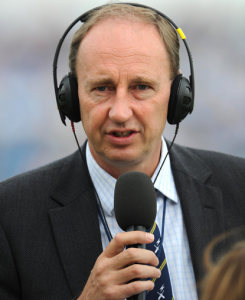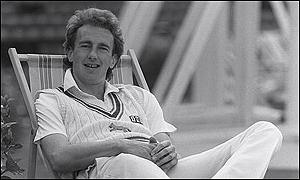
A gradual but inevitable descent into cricket-based loathing and bile.
The Commentators: Aggers
Jonathan Philip Agnew has been the BBC’s Cricket Correspondent for what seems like forever, but he still remains a joy to listen to, whether commentating on the action, running Test Match Special before and after play, interviewing guests or popping up on other radio programmes to offer his thoughts on the match in hand, or in some cases, whatever controversy
has emerged.
On TMS, Agnew has a natural ability to connect to whatever is being discussed and whoever is on air with him. Having been on the radio for 20 years, he is a link between the (g?)olden days of TMS and the modern multimedia era. His nickname (and twitter moniker) presumably stems from the early 1990s, when barely in his thirties, he retired from cricket and moved into the press box and then the commentary box; as with Blowers and Johnners before him, he became Aggers. Before Channel 4 and Sky transformed cricket on British television, TMS was the definitive cricket broadcaster and Aggers was able to fit into that eccentric, middle-aged chocolate cake and Chablis crowd with aplomb and verve. His description of Ian Botham being dismissed by Curtly Ambrose in 1991 must surely rank amongst the most famous radio, let alone
cricket broadcasting, moments ever – even if it is rather unprofessional to laugh uncontrollably and leave dead air.
It is a different world nowadays. As well as the long stints on the radio, Agnew writes columns on the BBC website, co-presents the podcast at the end of the day’s play and is a prolific tweeter. Although members of yesteryear’s TMS are still on the team, their likes have been joined by a younger generation of retired players, such as Phil Tufnell and Michael Vaughan. Agnew is equally adept at conversing with these as he is jousting with Geoffrey Boycott or talking about life as a county cricketer in the 1980s with Vic Marks. Indeed Agnew’s strength is his ability to communicate with his colleagues whilst also making the listeners feel that they are central to the broadcast. He fields – or where appropriate dodges – emails, texts and tweets with gusto and always sounds delighted to read these out on air. As ever, TMS during a rain delay can still be as good to listen to as during play, and Agnew deserves huge credit for the way in which he can navigate the broadcasting team through their meandering chat.
As well as commentating, Agnew is the regular interviewer for TMS. Guests will vary enormously: from the cricketing world, groundsmen, selectors, chief executives and ex-players; from the wider world, celebrity fans, politicians, singers and sportsmen. Some were critical of his slight fawning of Lily Allen, but it was to these ears a perfectly suitable, light-hearted interview with someone atypical of the usual TMS guests and it is impossible to contemplate any of the other regulars to have coped so well.
Although Geoffrey Boycott will tease Agnew ad nauseum about his playing career, Agnew was a very competent fast bowler, making great use of his height (6ft 4in)- though he himself can be rather self-deprecating. Following public school, he made his debut for Leicestershire in 1978 and won three England Test caps in the mid-1980s (as well as three ODI appearances). His Test Match figures of four wickets at 93 apiece is far from good, but in first-class cricket he took 666 wickets at 29.25 before his early retirement in 1990 at the age of 30. In 1987 he took 101 first-class wickets and was rewarded with being a Wisden Cricketer of the Year in 1988.
Whether summarising the overnight play from another continent on the Today programme, opining sensibly and objectively on the latest controversies to hit the game (he is excellent at capturing the spirit of cricket and focussing on what should really matter, as anyone who heard his rant on the ‘sucker gap’ between pitch inspections and the start of play would testify), or merely describing a wicket, a run or a dot ball, Agnew is always engaging. His broadcasts are characterised with wit and intelligence, but perhaps his best quality is his enthusiasm that flows to all who listen. Whatever changes happen to the game and to the media in the forthcoming years, be sure that Aggers will be there and will be talking about it brilliantly.



1 Comment
Post a Comment
1
AsankaG
20 Jul 2015 19:46
top commentator. Gets a bit emotional when England lose though. Good double act with Boycott.